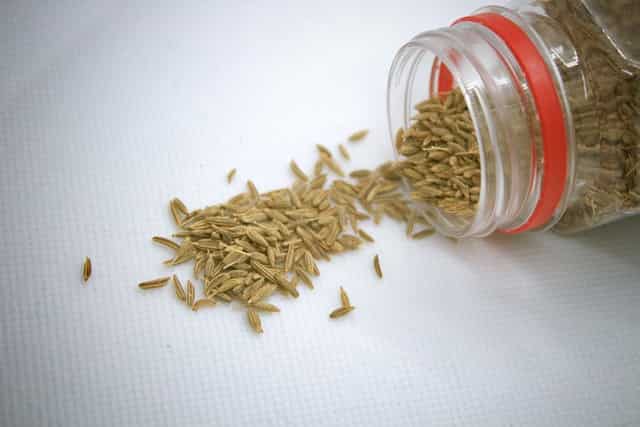
Cumin is a spice commonly used in various dishes to add flavor and aroma. It is often used in Indian, Middle Eastern, and Mexican cuisine. However, pet owners may wonder if it is safe to feed cumin to their dogs. Can dogs have cumin? The answer is yes, but in moderation.
Cumin is not toxic to dogs and can be included in their diet in small amounts. In fact, some dog food brands include cumin in their recipes. However, excessive consumption of cumin can cause digestive problems such as vomiting, diarrhea, and abdominal pain. It is important to note that dogs have different digestive systems compared to humans, and some spices that are safe for humans can be harmful to dogs.
As with any new food or spice, it is important to introduce cumin to your dog’s diet gradually and in small amounts. If your dog shows any signs of discomfort or digestive issues after consuming cumin, it is best to avoid feeding it to them in the future. While cumin can be a flavorful addition to your dog’s diet, it should never replace their regular meals and should always be given in moderation.
Can Dogs Eat Cumin?
Benefits of Cumin for Dogs
Cumin seeds are a rich source of iron, which is important for the production of red blood cells and energy levels in dogs. Cumin also contains magnesium, potassium, and calcium, which are essential minerals for maintaining healthy bones, muscles, and nerves.
In addition, cumin has anti-inflammatory properties that can help alleviate symptoms of arthritis and other inflammatory conditions in dogs. It also has antioxidants that can boost the immune system and protect against cell damage.
Risks of Cumin for Dogs
While cumin can provide some health benefits for dogs, it can also cause gastrointestinal issues if consumed in large amounts. Cumin can cause gas, bloating, and diarrhea, especially in dogs with sensitive stomachs. It may also cause vomiting if ingested in toxic doses.
Some dogs may have allergies or sensitivities to cumin or other spices, which can cause symptoms such as itching, swelling, or difficulty breathing. It is important to consult with a veterinarian before feeding your dog any new spices or supplements, especially if your dog has a history of allergies or digestive issues.

Safety and Preparing Cumin for Dogs
When feeding cumin to dogs, it is important to use small amounts and to prepare it properly. Cumin can be added to homemade dog food or treats, or sprinkled on top of cooked or baked dishes. It should never be given raw or in large quantities.
It is also important to avoid giving dogs any spices that are toxic or unsafe, such as onion, garlic, nutmeg, or cinnamon. These spices can cause dehydration, liver damage, or even death in dogs.
Preparing Cumin for Dogs
Cooked or Baked Cumin for Dogs
One way to prepare cumin for dogs is to cook or bake it. This can help to make it more digestible and reduce the risk of digestive upset. To cook or bake cumin for your dog, simply add it to their food or mix it with some plain, cooked meat or vegetables. You can also sprinkle it on top of their food as a seasoning.
Cumin Powder Dosage for Dogs
When it comes to cumin powder, it is important to use the right dosage. Too much cumin powder can cause digestive upset, while too little may not have any effect. The recommended dosage for cumin powder for dogs is approximately 1/8 teaspoon per 10 pounds of body weight. However, it is always best to start with a smaller amount and gradually increase the dosage as needed.
Cumin in Homemade Dog Food and Treats
Cumin Rice for Dogs
Cumin rice is a simple and nutritious dish that you can make for your furry friend. It is easy to prepare and can be a great addition to your dog’s diet. Here is a recipe for cumin rice for dogs:
Ingredients:
- 1 cup of brown rice
- 2 cups of water
- 1 teaspoon of cumin
Instructions:
- Rinse the rice thoroughly and drain.
- In a pot, add the rice, water, and cumin.
- Bring to a boil, then reduce the heat to low and cover.
- Simmer for 30-40 minutes or until the rice is cooked.
- Let cool before serving to your dog.

Homemade Dog Treats with Cumin
If you enjoy making homemade dog treats, you can add cumin to the mix for a unique flavor. Here is a recipe for homemade dog treats with cumin:
Ingredients:
- 2 cups of whole wheat flour
- 1/2 cup of rolled oats
- 1/2 cup of water
- 1/4 cup of vegetable oil
- 1 egg
- 1 teaspoon of cumin
Instructions:
- Preheat the oven to 350°F.
- In a bowl, mix together the flour, oats, and cumin.
- In a separate bowl, whisk the egg, water, and vegetable oil.
- Add the wet ingredients to the dry ingredients and mix until well combined.
- Roll out the dough and cut into desired shapes.
- Place the treats on a baking sheet and bake for 20-25 minutes or until golden brown.
- Let cool before serving to your dog.
Cumin and Other Spices for Dogs
Cumin and Onion or Garlic for Dogs
While cumin and turmeric are safe for dogs, onion and garlic are not. These spices contain compounds that can damage a dog’s red blood cells, leading to anemia.
It’s important to avoid feeding your dog any food that contains onion or garlic, including those that may contain cumin or turmeric as well. Always check the ingredient list before giving your dog any food or treats.
Other Spices for Dogs
While cumin and turmeric are safe for dogs, not all spices are. Some spices, such as nutmeg and cinnamon, can be toxic to dogs in large amounts.
It’s important to do your research and consult with your veterinarian before giving your dog any new spices or seasonings. Additionally, it’s important to only give your dog small amounts of any spice, as too much can cause digestive upset or other adverse reactions.

Conclusion
In conclusion, cumin is generally safe for dogs to consume in small amounts. However, it is important to keep in mind that every dog is different and may react differently to certain foods. As with any new food, it is recommended to introduce cumin slowly and in small quantities to monitor any potential adverse reactions.
While cumin is not toxic to dogs, consuming large amounts may cause digestive upset such as vomiting or diarrhea. It is also important to note that cumin may not be suitable for dogs with certain medical conditions such as liver or kidney disease.
Overall, it is best to consult with a veterinarian before introducing any new food to a dog’s diet. They can provide guidance on what is safe and appropriate for each individual dog based on their specific needs and health history. By taking proper precautions and monitoring their dog’s reactions, pet owners can ensure that their furry friends stay healthy and happy.